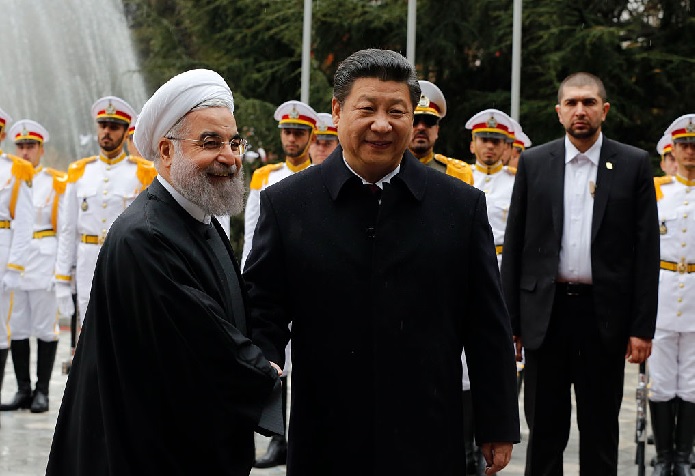
Announcing Iran’s intention to build a new military base in the Indian Ocean, Admiral Alireza Tangsiri, the commander of the naval attachment of Iran’s Islamic Revolutionary Guard Corps (IRGC), said that the base would be used to protect fishing and commercial vessels from piracy and “foreign ships”, a reference to the US-led multinational naval task force that is currently protecting Gulf shipping from Iranian interference.
As part of the deal negotiated with Beijing, China is to be allowed access to a number of Iranian ports, including Chabahar, with the Chinese reported to be planning to build a new military base in the vicinity of the port.
The construction of such a base would enable the Chinese Navy to monitor the activities of the U.S. Navy in the area, in particular the U.S. Navy’s Fifth Fleet in the Gulf, which is permanently deployed to protect shipping passing through the Strait of Hormuz, one of the world’s most important economic waterways.
Any expansion in Iranian and Chinese military activity in the region would also have an impact on the jointly-administered U.S.-UK base on the island of Diego Garcia, one of the Pentagon’s most important military assets in the region.
The U.S. faces the prospect of a serious escalation in tensions with Iran after Tehran’s announcement that it intends to build a new military base in the Indian Ocean by the end of the year.
The Iranian announcement, moreover, comes at a time when Tehran is on the point of signing a $400 billion trade deal with China, which will include closer military cooperation between the two countries in the region in an attempt to counter Washington’s traditional dominance.
Under the terms of the deal, details of which have been published in the New York Times, Iran could receive as much as $400 billion in Chinese investment over the next quarter of a century.
The agreement, which a senior aide to Iranian President Hassan Rouhani says should be signed by March next year, also encompasses closer military cooperation between the two countries, including weapons development, combined training and intelligence sharing in order to combat “the lopsided battle with terrorism, drug and human trafficking and cross-border crimes.”
As part of the new era of cooperation between Tehran and Beijing, concerns have been raised by Western security officials that this could lead to the two countries forming an alliance to bolster their presence in the Indian Ocean, thereby challenging America’s long-standing dominance in the nearby Gulf region.
Announcing Iran’s intention to build a new military base in the Indian Ocean, Admiral Alireza Tangsiri, the commander of the naval attachment of Iran’s Islamic Revolutionary Guard Corps (IRGC), said that the base would be used to protect fishing and commercial vessels from piracy and “foreign ships”, a reference to the US-led multinational naval task force that is currently protecting Gulf shipping from Iranian interference.
Iran has so far given no indication as to where it intends to build its new base. At present Chabahar port in the Gulf of Oman, which is used, among other activities, for shipping goods to Afghanistan, is the nearest base Iran has to the Indian Ocean.
As part of the deal negotiated with Beijing, China is to be allowed access to a number of Iranian ports, including Chabahar, with the Chinese reported to be planning to build a new military base in the vicinity of the port.
The construction of such a base would enable the Chinese Navy to monitor the activities of the U.S. Navy in the area, in particular the U.S. Navy’s Fifth Fleet in the Gulf, which is permanently deployed to protect shipping passing through the Strait of Hormuz, one of the world’s most important economic waterways.
Any expansion in Iranian and Chinese military activity in the region would also have an impact on the jointly-administered US-UK base on the island of Diego Garcia, one of the Pentagon’s most important military assets in the region.
Earlier this year Washington dispatched a fleet of B-52 bombers to Diego Garcia following the sharp rise in tensions with Tehran in the wake of the assassination of Qassem Soleimani, the IRGC commander who headed the elite Quds Force.
The prospect of a new Iran-China military alliance taking shape in the Indian Ocean is certainly a development that will be taken with the utmost seriousness by the American military, which is already concerned about Iran’s attempts to spread its influence throughout the region.
U.S. Marine Corps General Kenneth McKenzie, the commander of U.S. Central Command, warned in a recent interview that Iran posed the greatest threat to regional security and stability.
“Iran actively stokes instability and is intent on degrading security all over the region,” McKenzie said. “They use proxies and violence to push other nations in the region to their agenda.”
Any future military alliance between Tehran and Beijing would only strengthen Iran’s determination to expand their malign activities in the region, thereby raising the prospect of a further escalation of tensions with the U.S. and its allies.
 Eurasia Press & News
Eurasia Press & News



